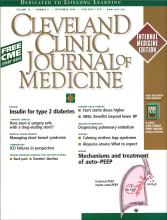Table of Contents
From the Editor
- Is a pound of prevention better than an ounce of prevention?
With statins, should we “start low and go slow” or adopt a new paradigm?
Editorial
- Dose-related statin myopathy: Is it an issue?
Higher doses lead to more cases of myopathy, a potentially serious problem. Fortunately, the incidence is very low.
Review
- Alopecia areata: What to expect from current treatments
Alopecia areata often resolves on its own, but some treatment is often needed due to the psychosocial impact.
- Restless legs syndrome: Keys to recognition and treatment
Although the condition is common, a high index of suspicion is needed to diagnose it.
- Emerging care for type 2 diabetes: Using insulin to reach lower glycemic goals
Experts are advocating earlier, more aggressive treatment of type 2 diabetes.
- Auto-positive end-expiratory pressure: Mechanisms and treatment
This common problem in mechanical ventilation increases the work of breathing, worsens gas exchange, and decreases cardiac output.
Current Drug Therapy
- Statins: The case for higher, individualized starting doses
We’re not getting our patients’ low-density lipoprotein cholesterol down to goal levels. We would do better by starting at a higher dose if the patient has a higher baseline level.
1-Minute Consult
- How soon can a patient undergo noncardiac surgery after receiving a drug-eluting stent?
Lacking direct data, we base our approach on data from patients with bare-metal stents and from patients receiving antiplatelet therapy for acute coronary syndromes.
Imaging in Practice
- Diagnostic imaging approach to pulmonary embolism
A man with cancer presents with new dyspnea and low-grade fever. What is the best diagnostic approach?
Current Drug Therapy
- Angiotensin-receptor blockers: Benefits beyond lowering blood pressure
These drugs improve the prognosis more than one would expect from their effect on blood pressure alone.
Medical Grand Rounds
- Managing short bowel syndrome: Making the most of what the patient still has
Eating and drinking are better than parenteral nutrition.
Departments
- Intravascular ultrasonography in coronary atherosclerosis trials (June 2005)
Intravascular ultrasonography in coronary atherosclerosis





Commentary
A device recall does not call for panic. Physicians should weigh the risks and benefits for the individual patient.